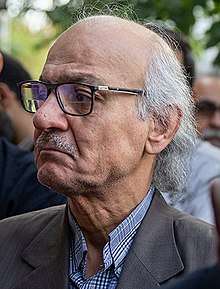Hashem Aghajari
Hashem Aghajari (Persian: هاشم آقاجری) also Seyyed Hashem Aghajari (born 1957) is an Iranian historian, university professor and a critic of the Islamic Republic's government who was sentenced to death in 2002 for apostasy for a speech he gave on Islam urging Iranians to "not blindly follow" Islamic clerics.[1] In 2004, after domestic Iranian and international outcry, his sentence was reduced to five years in prison.

Overview
Hashem Aghajari served in the Iran-Iraq War where he lost his right leg below the knee,[2] and his brother. He has been described as having an "impeccable Islamic revolutionary record."[3]
He was a history professor at Tarbiat Modares University,[4] a teacher-training college in Tehran. In June 2002 Aghajari gave an address in Hamadan commemorating the 25th anniversary of the death of Dr. Ali Shariati, criticized some of the present Islamic practices in Iran as being in contradiction with the original practices and ideology of Islam, and calling for "Islamic Protestantism" and reform in Islam. This prompted an "immediate outcry" from hard-line clerics, who claimed that he was attacking "the Prophet of Islam and fundamental Shiite Islamic traditions", although Dr. Aghajari has repeatedly denied that his speech was intended as an attack on Islam or the Prophet.[5]
Arrest, trial, sentence and imprisonment
He was arrested 8 August. The trial was criticized not only for its harshness but for falling "far short of international standards of due process," being "conducted behind closed doors", and giving the defendant "only limited access to his lawyer."[6] According to the conservative newspaper Jumhuri Eslami, the Supreme Leader's order was (at first) "flagrantly" ignored by prosecutor general Abdolnabi Namazi.[7] According to The Economist magazine, Supreme leader Khamenei ordered the judiciary to review Aghajari's death sentence, but "hardliners in the judiciary at first ignored" his order "then assigned their least lenient judges to the review."[8]
Although other controversial death sentences have been reduced on appeal, Aghajari refused to appeal the ruling, announcing through his lawyer that "those who have issued this verdict have to implement it if they think it is right or else the judiciary has to handle it."[2] While in prison his family reported that Aghajari's amputated leg stub was bruised and infected and that he was "unable to stand up, walk or use the prison's hygiene facilities."[4] The human rights group, Amnesty International, campaigned against the sentence.[9]
The death sentence was denounced by many. The Iranian parliament, President Mohammad Khatami, and Grand Ayatollah Hossein-Ali Montazeri[3] condemned it.
Demonstrations against the sentence began the day after it was made public on November 6. They are thought to have attracted no more than 5000 participants but nonetheless were "the most serious protests in Iran since 1999" and are thought to have provoked Supreme Leader Ali Khamenei to order a review of the verdict and a threat to use "popular forces" (basij) against the demonstrators.[10][11]
The sentence was later commuted to three years in jail, two years in probation, and five years' suspension of his social rights by the Supreme Court of Iran. In May 2004 the original regional court reinstated the death sentence, but the next month Iran's Supreme Court again reduced it.[12]
He was released from prison July 31, 2004 after paying a bail of $122,500, according to the Associated Press.[12]
Explanation
According to Mashallah Shamsolvaezin, a "leading Iranian newspaper editor and confidant of Iranian President Mohammad Khatami" interviewed by Newsweek magazine, the arrest and stiff sentence were an attempt to distract attention from two bills to increase the power of president and curb the hard-liner conservatives' supervisory power which reformist President Khatami had introduced into Parliament.[13]
The failure of Iran's Hezbollah paramilitaries to make "a serious attempt to break up" the peaceful reformist student protests over the sentence was thought to be associated with Supreme Leader Khamenei's implicit criticism of the sentence and the "impartiality" of his failing to side with conservative hardliners.[14]
Awards and honors
- Jan Karski Award for Moral Courage (2003)
See also
- Human rights in Islamic Republic of Iran
- Chained Murders of Iran
References
- "Iranian Court Again Spares Professor's Life" BURTON BOLLAG. The Chronicle of Higher Education. Washington: June 18, 2004. Vol. 50, Iss. 41; p.A.41
- "Liberal martyrdom in Iran", Charles Paul Freund. Reason. Los Angeles: February 2003. Vol. 34, Iss. 9; pg. 18, 2 pgs
- 9 November, 2002, Iran death sentence angers reformists
- Juan Cole, Informed Comment, Amnesty International Appeal for Dr. Aghajari
- AAAS Human Rights Action Network. 12 November 2002
- "Statement Protesting the Sentenced Execution of Professor Hashem Aghajari"; [1] Hamid Dabashi, Arien Mack, David Bromwich, Noam Chomsky, et al. Social Research. New York: Winter 2002. Vol. 69, Iss. 4; pg. IX, 5 pgs
- Christopher de Bellaigue, The Struggle for Iran, New York Review of Books, 2007, p.47
- "International: Hard centres; Iranian conservatives", The Economist. London: December 21, 2002. Vol. 365, Iss. 8304; pg. 72
- 2 December, 2002, Iranian academic facing death
- Christopher de Bellaigue, The Struggle for Iran, New York Review of Books, 2007, p.39
- "Iran/Iraq" Nizar Wattad, Paola Rizzuto. The Washington Report on Middle East Affairs. Washington: October 2003. Vol. 22, Iss. 8; pg. 39
- "Iranian Professor Freed From Prison," RICHARD MONASTERSKY, The Chronicle of Higher Education, Washington: August 13, 2004. Vol. 50, Iss. 49; pg. A.40
- "'There Is No Other Way'; The Last Word"; [Atlantic Edition] Maziar Bahari. Newsweek. (International ed.). New York: November 25, 2002. pg. 70
- "International: Khatami's last stand, perhaps; Iran's struggle for reform", The Economist. London: November 16, 2002. Vol. 365, Iss. 8299; pg. 64
External links
- (in Persian) BBC Persian article on Aghajari's new sentence
- Text of offending June 2002 speech
- hrw.org, November 2002, Iran: Academic’s Death Sentence Condemned